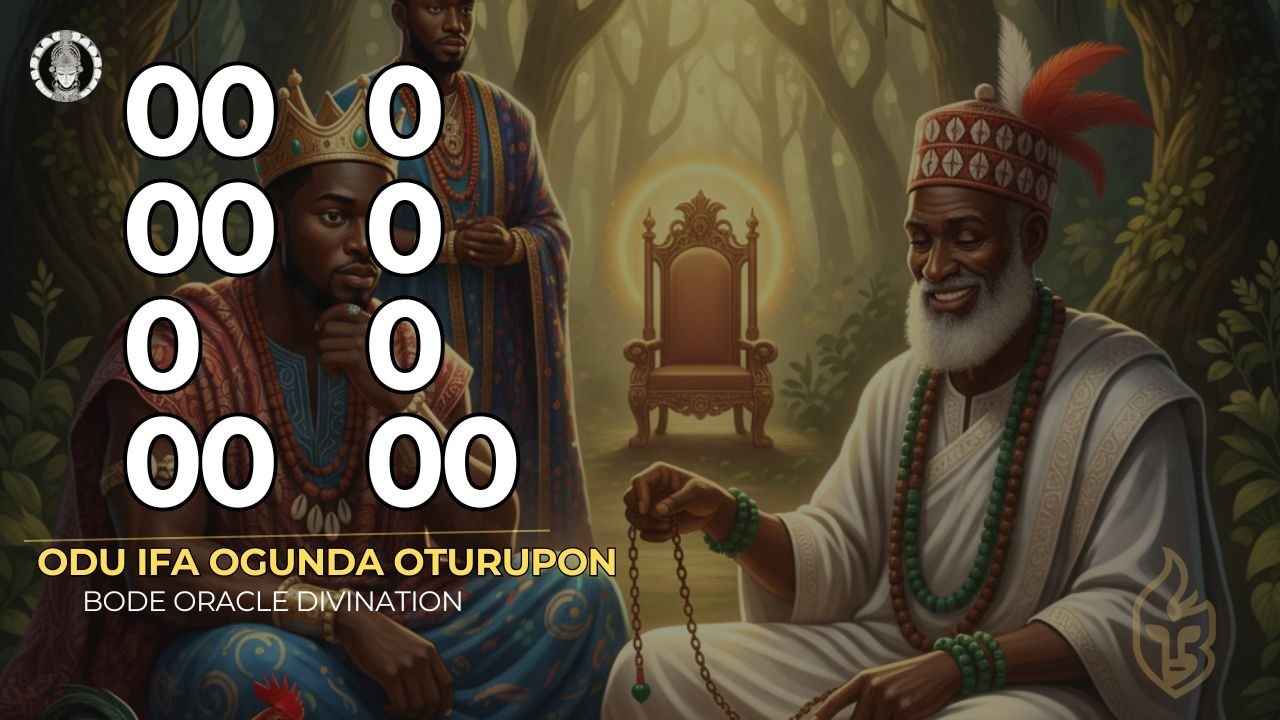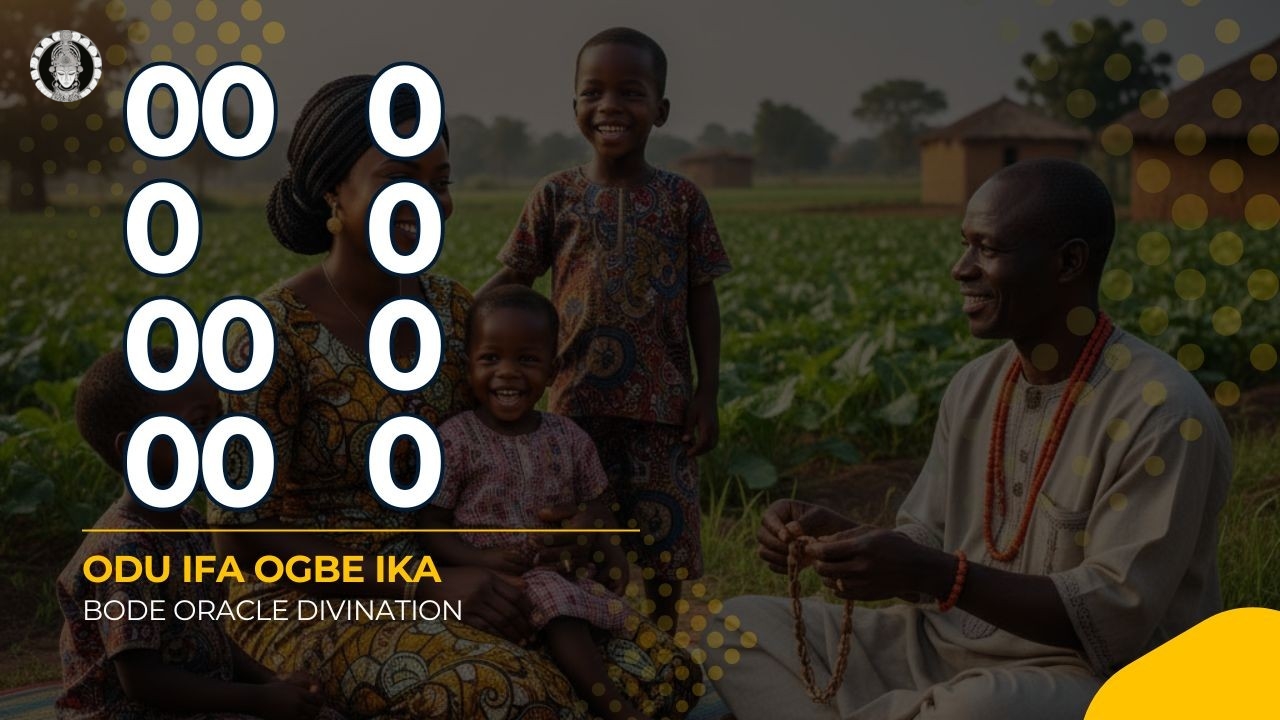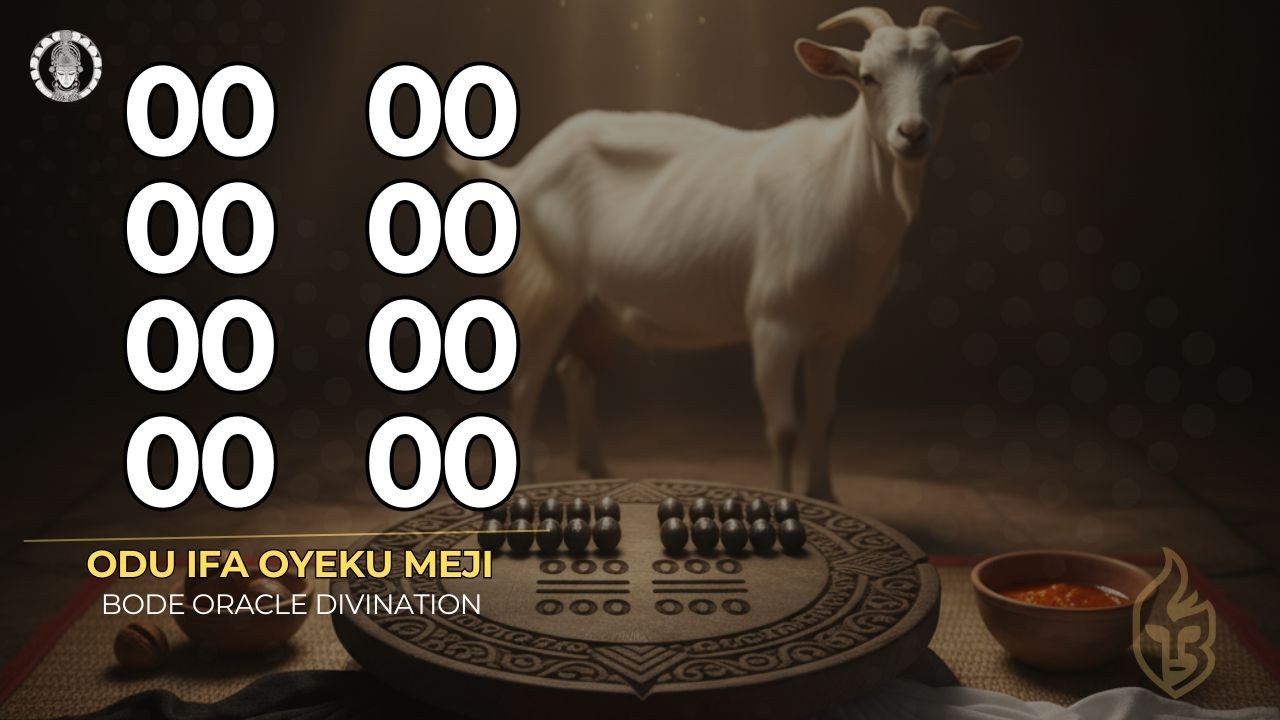Introduction to Odu Ifa Oyeku Meji
Odu Ifa Oyeku Meji stands as one of the 16 principal Odu in the sacred Ifa divination system. As a Meji Odu—one where the same pattern appears on both sides during divination—it carries profound spiritual authority and represents perfect balance in dualities. Oyeku Meji speaks directly to matters of life and death, transformation and renewal, and the eternal struggle between mortality and immortality.
This powerful Odu teaches that death is not an inevitability to be passively accepted but a force that can be negotiated with through proper spiritual practice. The divinations within Oyeku Meji reveal how sacrifice, transformation, and spiritual wisdom combine to ensure longevity and protect against sudden death. Through the stories of Baba Yeku Yeku and Enlojo Aso, we learn that compliance with Ifa's prescriptions transforms potential tragedy into blessing and apparent endings into new beginnings. For comprehensive understanding of the Ifa divination system and its philosophical foundations, explore scholarly resources on this ancient wisdom tradition.
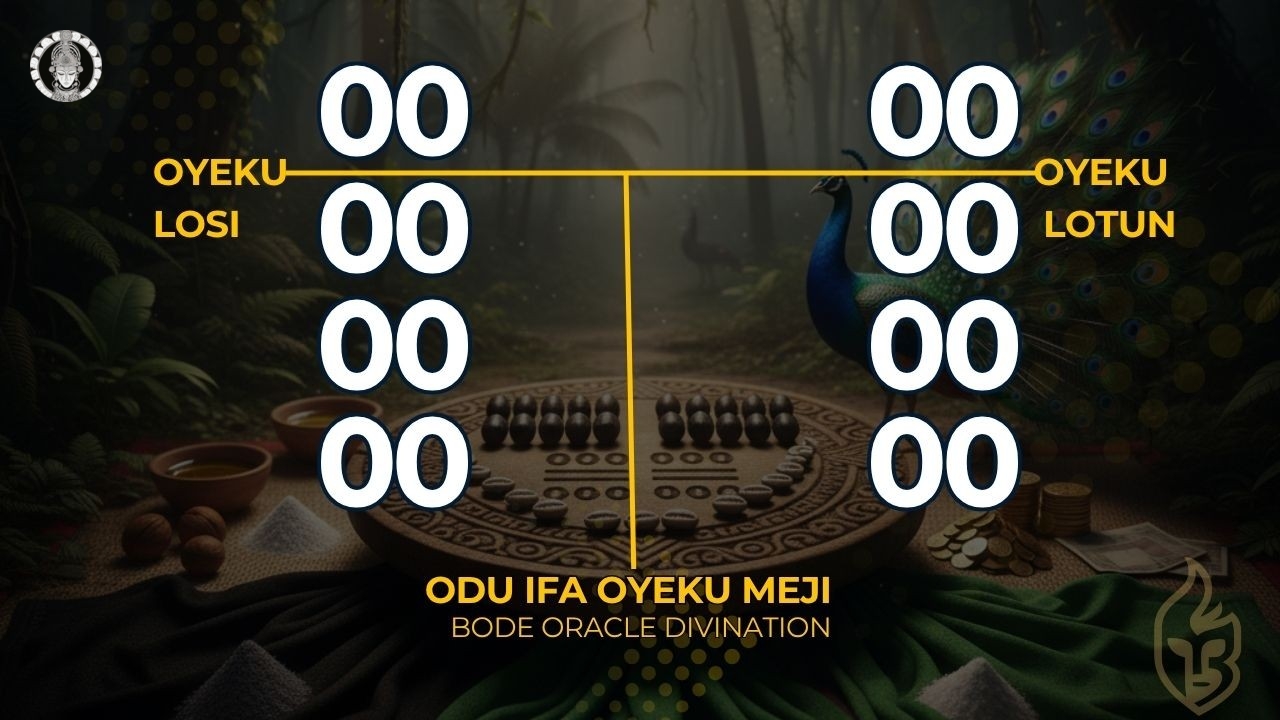
Ifa Divination for Baba Yeku Yeku: The Avenger of Death
Understanding the Threat of Sudden Death
The divination of Baba Yeku Yeku addresses one of humanity's deepest fears—the possibility of sudden, premature death (iku ojiji). Ifa reveals that this person is at risk of unexpected death, yet simultaneously provides the spiritual solution to avert this fate. This duality reflects the essence of Oyeku Meji itself: darkness and light, death and life, danger and salvation exist together, and the choice between them depends on spiritual action.
Baba Yeku Yeku receives the title "the one who would be regarded as the avenger of death" (Oyeku Sapana). This powerful designation suggests that through proper sacrifice and spiritual compliance, one does not merely avoid death but actively conquers it, becoming an agent of life and longevity. The title indicates that the person who successfully performs the prescribed sacrifice transforms from potential victim to spiritual victor.
The Dawn of New Life
The verse opens with a profound image: "Oyesese labo loke—The people thought it was a new dawn." This metaphor establishes the fundamental teaching of Oyeku Meji regarding cycles, renewal, and transformation. Just as dawn inevitably follows the darkest part of night, life and renewal can follow even the direst spiritual circumstances when proper sacrifice is made.
The association with dawn also suggests awakening, awareness, and the revelation of truth. What appears as darkness (Oyeku) contains within it the seeds of light and new beginning. This teaches that even when faced with death predictions or spiritual danger, the situation contains the potential for transformation and new life through Ifa's guidance.
The Sacred Verse
Oyesese labo loke
Omo araye se bi oju mo lomon
Adifafun baba yeku yeku
Ti won o mope o ni oyeku sapana
Ebo ni won ni ko se
O si gbebo nibe o rubo
Nje kini yio yeku nu lori awo
Eji oye Ifa ni yio yeku nu lori awo
Eji oye.
English Translation
Oyesese labo loke
The people thought it was a new dawn.
This was the Ifá divination for Baba Yeku Yeku,
The one who would be regarded as the avenger of death.
He was advised to offer sacrifice,
And he complied.
Thus, what will drive sudden death away from the priest
Eji Oye Is an Ifá that will deliver the priest Eji Oye from sudden death.
The Power of Eji Oye
The verse concludes with a powerful invocation of Eji Oye, another name for Oyeku Meji itself. The question "What will drive sudden death away from the priest?" is answered by calling upon the Odu's own authority: "Eji Oye Ifa ni yio yeku nu lori awo." This creates a self-referential spiritual loop—the Odu itself becomes the medicine for the condition it diagnoses.
This teaches that the wisdom contained within Oyeku Meji, when properly understood and applied through sacrifice, becomes the antidote to the very dangers it warns about. The priest who masters this Odu and complies with its prescriptions gains protection through the Odu's own spiritual power. To understand how Ifa operates as a comprehensive knowledge system, consult UNESCO's documentation of Ifa divination practices.
Prescribed Offerings (Ebo)
For protection against sudden death and to ensure longevity, Ifa prescribes specific offerings. These include a goat (oruko kan), which serves as a powerful substitute for the person in the spiritual realm; palm oil (epo), representing the smooth flow of life force and the ability to navigate spiritual challenges; eko (fermented corn pudding), symbolizing sustenance and the foundation of life; kola nut (obi), which opens spiritual pathways and facilitates communication with divine forces; and money (owo), which acknowledges the material dimension of sacrifice and ensures the completeness of the offering.
The Imperative of Sacrifice
The verse emphasizes that "Ifa ni ebo ni kose dada"—Ifa says that sacrifices must always be made properly. This is not a casual suggestion but a spiritual imperative. The success of Baba Yeku Yeku in averting death came specifically because "O si gbebo nibe o rubo"—he complied with the sacrifice. Compliance, not merely knowledge, is what transforms potential tragedy into blessing.
Practical Application for Modern Times
In contemporary contexts, this divination speaks to anyone facing health crises, dangerous situations, or predictions of harm. While modern medicine has its place, Oyeku Meji teaches that spiritual intervention remains essential. The Odu does not advocate abandoning practical solutions but emphasizes that spiritual preparation through sacrifice must accompany any other efforts to preserve life and ensure longevity.
Ifa Divination for Enlojo Aso: The Wisdom of Transformation
The Journey from Heaven to Earth
This divination addresses Enlojo Aso—the Numbers of Dressing or the Elements of Clothing—on the day they were descending from heaven to earth. This cosmological framing establishes that the wisdom contained in this verse predates human existence and represents eternal spiritual principles. Clothing, as a metaphor, represents how we present ourselves, adapt to circumstances, and undergo transformation throughout life.
The journey from heaven (orun) to earth (aye) signifies the transition from pure spiritual essence to physical manifestation. Just as clothing must be appropriate for different situations and must be changed when worn or soiled, so too must humans be willing to transform, adapt, and renew themselves throughout their earthly journey. For scholarly analysis of Yoruba cosmology and the heaven-earth relationship, see UNESCO's documentation of Ifa traditions.
The Power of Threefold Unity
This divination specifically addresses three children of the same mother (awon omo iya meta). The emphasis on maternal connection highlights the spiritual significance of shared blood and shared destiny. In Yoruba cosmology, children of the same mother share not only biological ties but spiritual connections that can affect each other's fortunes.
The instruction that all three must offer sacrifice together creates a powerful spiritual synergy. Individual sacrifice has power, but collective sacrifice by blood relatives multiplies that power. This teaches the importance of family unity in spiritual matters and the responsibility siblings bear for each other's wellbeing and longevity.
The Sacred Verse
Opa gbogbo ni siwaju agbon nini
Ese mejeji ni jija de ona gborogan gborogan
Ati pe obi enu bobo aso kitipa abita wele
Adifa fun enlojo aso
Lojo ti won tode orun bo wale aye
Ebo ni won ni ki won ose
Won gbe bo ni be won rubo
Nje kele loru o
Kele lo tu
Nje aso tomebo kiyo ruu
Toba toku je tan yio pada seyin
Aso tomebo ki yorun.
English Translation
It is the great staff that advances with every step.
It is the two legs that make movements on the path.
Ati pe obi enu bobo aso kitipa abita wele
This was the Ifá divination for the Numbers of Dressing
On the day they were coming from heaven.
They were advised to offer sacrifice,
And they complied.
Thus, it was Kele who offered,
It was Kele who offered.
Therefore, it is the clothing that understands the offering of sacrifice.
Do not become useless.
When you are about to become useless, change your path.
Clothing that understands sacrifice does not become worn out.
The Metaphor of Staff and Legs
The opening lines present complementary images: "It is the great staff that advances with every step. It is the two legs that make movements on the path." The staff represents spiritual guidance, wisdom, and support—the vertical connection to divine knowledge. The two legs represent practical action, physical movement, and the horizontal journey through earthly life.
Together, these images teach that spiritual progress requires both divine guidance (the staff) and human action (the legs). Neither alone is sufficient. This balance between spiritual preparation and practical engagement characterizes the wisdom of Oyeku Meji and reflects the dual nature of the Odu itself.
The Transformative Power of Clothing
The central teaching of this divination uses clothing as a profound metaphor for transformation and renewal. The verse states: "Aso tomebo kiyo ruu. Toba toku je tan yio pada seyin. Aso tomebo ki yorun"—Clothing that understands sacrifice does not become useless. When it is about to become useless, it changes its path. Clothing that understands sacrifice does not become worn out.
This teaches that when we recognize the need for transformation and are willing to make the necessary sacrifices, we prevent ourselves from becoming spiritually obsolete or ineffective. Just as wise people change their clothes when they become dirty or worn, spiritually aware individuals transform their approaches, attitudes, and behaviors when these no longer serve life's purpose.
The Three Sacred Colors
The prescription of three colors of cloth—black (aso dudu), red (aso pupa), and white (aso funfun)—represents the full spectrum of existence and the completeness of transformation. Black symbolizes depth, mystery, wisdom, and the unknown—the fertile darkness from which all emerges. Red represents vitality, passion, life force, and the courage to act. White signifies purity, clarity, spiritual illumination, and the refined essence of being.
Together, these three colors demonstrate that longevity and spiritual success require embracing all aspects of existence. We cannot achieve wholeness by accepting only the light and rejecting the darkness, or by embracing only passion while avoiding purity. Complete spiritual transformation requires integrating all dimensions of being.
Prescribed Offerings (Ebo)
The sacrifice prescribed for Enlojo Aso includes black clothing (aso dudu), red clothing (aso pupa), white clothing (aso funfun), a goat (eran ewure kan), eko (fermented corn pudding), palm oil (epo), and kola nut (obi). The clothing represents the willingness to transform across all dimensions of being, while the other items ensure the spiritual efficacy of the offering and provide sustenance for the journey of transformation.
Practical Application for Modern Times
In contemporary life, this divination speaks powerfully to anyone feeling stuck in patterns that no longer serve them. The teaching that "when you are about to become useless, change your path" applies to careers that have become stagnant, relationships that have become toxic, habits that have become destructive, and beliefs that have become limiting. Oyeku Meji teaches that transformation is not failure but wisdom, and that the willingness to change is what ensures continued vitality and relevance throughout life.
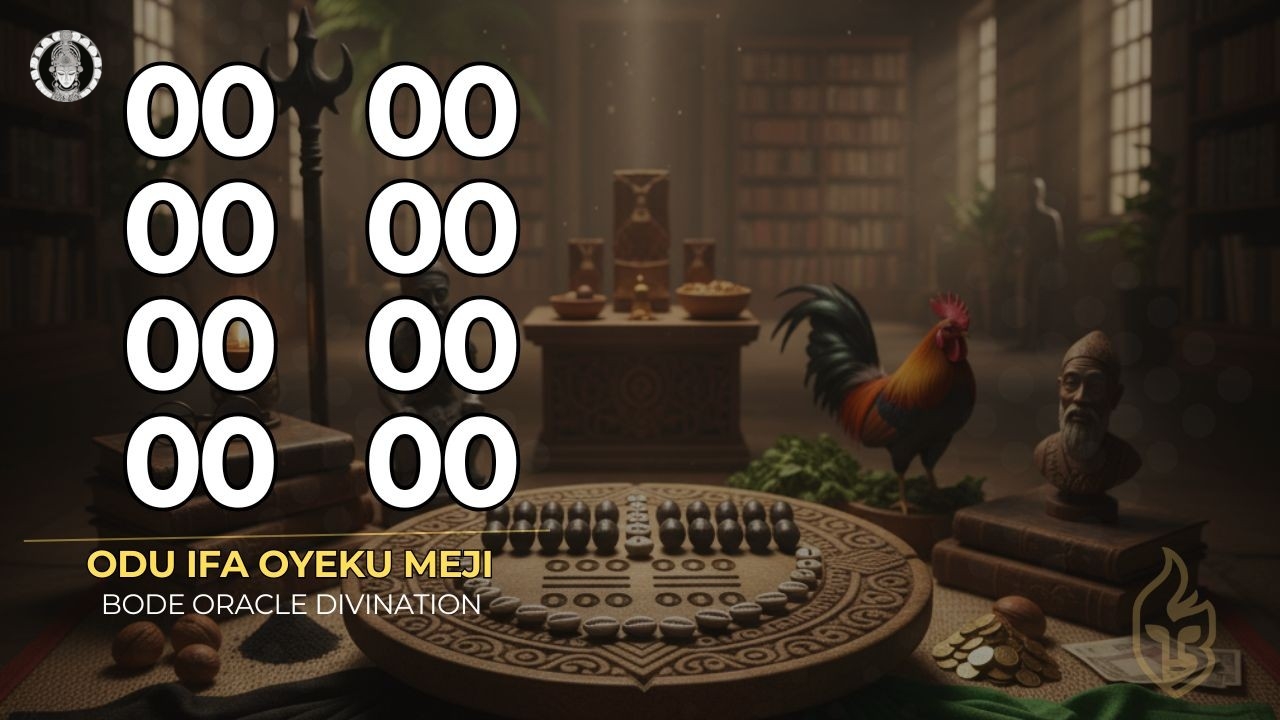
Spiritual Wisdom and Practices of Oyeku Meji
The Philosophy of Duality and Balance
As a Meji Odu, Oyeku Meji embodies the principle of perfect duality. The same pattern appearing on both sides of the divination chain represents balance, mirroring, and the integration of opposites. This Odu teaches that life and death, darkness and light, ending and beginning are not separate opposing forces but complementary aspects of a unified whole.
Understanding this duality helps practitioners navigate life's challenges with wisdom. When facing apparent endings or losses, Oyeku Meji teaches us to recognize the seeds of new beginnings contained within. When experiencing darkness or difficulty, this Odu reminds us that dawn inevitably follows night. This philosophical foundation provides emotional resilience and spiritual perspective during challenging times.
The Principle of Timely Sacrifice
Both divinations within Oyeku Meji emphasize immediate compliance with sacrificial prescriptions. The phrase "O si gbebo nibe o rubo" (he complied and offered sacrifice) appears in both verses, highlighting that the effectiveness of Ifa's guidance depends not just on knowledge but on timely action. Postponement or procrastination in spiritual matters can allow the very dangers Ifa warns about to manifest.
This teaches that spiritual practice requires discipline and immediate response. When Ifa prescribes sacrifice, delay diminishes effectiveness. The power of sacrifice lies partly in the demonstration of faith through immediate action, showing trust in divine guidance even before results are visible. For deeper understanding of sacrifice in African religious traditions, explore academic resources on Ifa divination practices.
Family Unity in Spiritual Practice
The instruction that three siblings must offer sacrifice together reveals important principles about family spiritual bonds. In Yoruba cosmology, children of the same mother share spiritual connections that transcend individual destinies. What affects one can influence all, and what all do together creates amplified spiritual power.
This teaching extends beyond biological family to spiritual families and communities. When groups unite in proper spiritual practice, they create protective fields that benefit all members. The modern application includes families praying together, communities supporting each other spiritually, and groups collectively addressing shared challenges through unified spiritual action.
The Role of the Babalawo
All sacrifices and spiritual preparations prescribed in Oyeku Meji should be performed under the guidance of a qualified Babalawo (Ifa priest). The Babalawo serves as the intermediary who ensures proper procedures, invokes necessary incantations, and adapts traditional practices to modern contexts while maintaining their spiritual integrity.
The priest's role is not merely ceremonial but essential to the spiritual efficacy of the work. Through years of training and initiation, the Babalawo develops the spiritual authority and knowledge necessary to activate the power of sacrifice. Attempting to perform these rituals without proper guidance can be ineffective or even spiritually dangerous.
Transformation as Spiritual Necessity
The teaching that clothing must change its path when becoming useless applies to all aspects of spiritual and physical life. Oyeku Meji emphasizes that stagnation is spiritual death, while transformation is the secret of longevity. This requires honesty in self-assessment—recognizing when our approaches, attitudes, or behaviors have become ineffective—and courage to embrace change.
Transformation involves sacrifice—letting go of familiar patterns, comfortable identities, and established ways of being. Yet this Odu teaches that such sacrifice is not loss but renewal. Like the snake shedding its skin or the butterfly emerging from the chrysalis, transformation through sacrifice leads to new life and continued vitality.
The Integration of Opposites
The prescription of three colors (black, red, white) in the Enlojo Aso divination teaches that spiritual completeness requires integrating seemingly opposite qualities. We must embrace both darkness and light, passion and purity, the known and the unknown. Rejecting any aspect of existence creates imbalance and vulnerability.
Modern practitioners can apply this teaching by accepting all aspects of their humanity—the shadow and the light, the weakness and the strength, the past and the potential. Wholeness comes not from perfection but from integration, not from denial but from acceptance and transformation of all that we are.
Behavioral Guidelines from Oyeku Meji
This Odu provides several important behavioral guidelines for those who receive it in divination. One must be willing to make sacrifices promptly without delay or procrastination. Family members should unite in spiritual practice rather than approaching challenges individually. Practitioners must be honest about when transformation is needed rather than clinging to outdated patterns. Most importantly, one must maintain faith in the spiritual process even when results are not immediately visible.
These guidelines serve not as restrictions but as protective wisdom. Following them creates the conditions under which Ifa's blessings can manifest fully, while ignoring them leaves one vulnerable to the very dangers the Odu warns against.
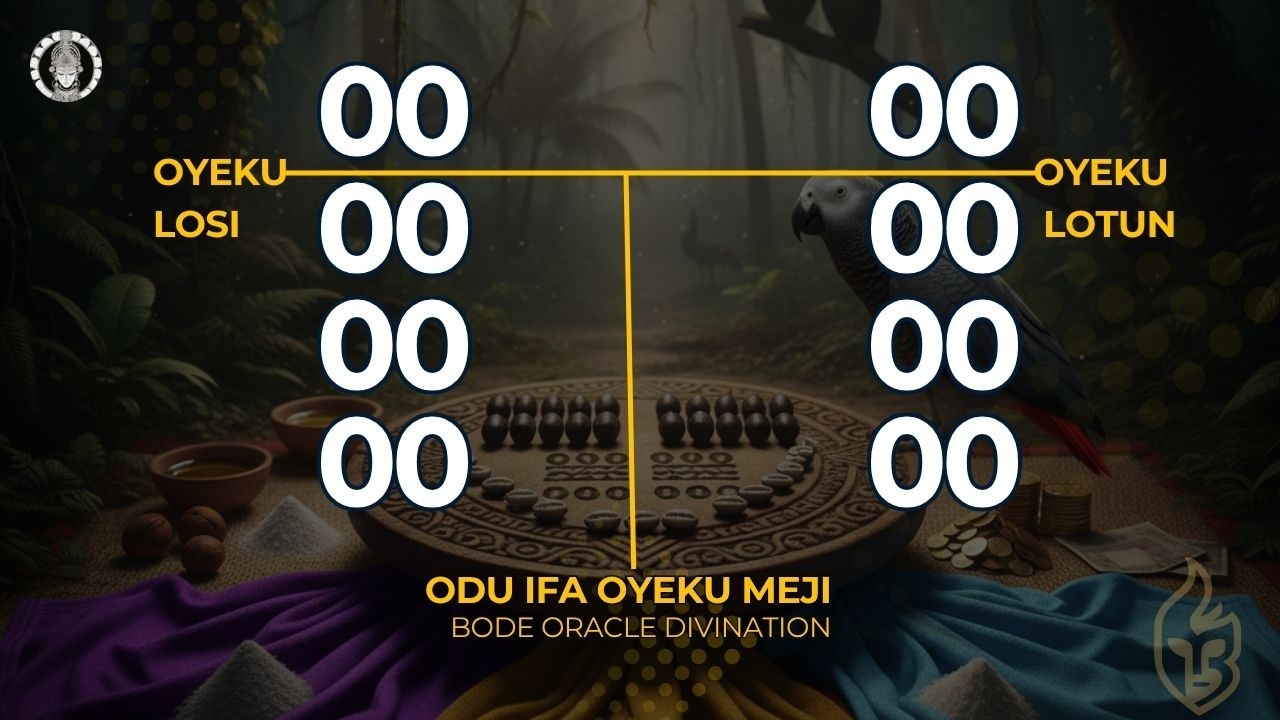
Additional Resources
Internal Links
- Complete Guide to Oyeku Meji - Detailed information, taboos, and practices
- Oyeku Meji Blog Post
- Bode.ng Blog - Extensive collection of Ifa and Yoruba spirituality articles
- Complete Odu Ifa Directory
- Bode Oracle - Divination services and community resources
External Resources
- African Traditional Religions: Ifa Divination - Duquesne University
- Ifa Divination System - Wikipedia
- UNESCO Recognition of Ifa Divination System
- Ifa of the Yoruba People of Nigeria - UNESCO Archives
- Opon Ifa (Divination Tray) - Wikipedia
- Algebraic Characterization of Ifa Main Divination Codes - ScienceDirect
Connect With Us on Social Media
- BODE Oracle on TikTok
- BODE Oracle on YouTube
- BODE Oracle on Facebook
- BODE Oracle on X (Twitter)
- BODE Oracle on Pinterest
Visit Bode.ng to explore more divination teachings, participate in quizzes and polls, and connect with our community of practitioners and learners. Register today to access exclusive content and personalized guidance on your spiritual journey.
Frequently Asked Questions And Answers About Odu Ifa Oyeku Meji
Find answers to common questions about this sacred Odu Ifa and its divination teachings
Oyeku Meji is one of the principal Odu in the Ifa corpus, specifically one of the 16 major Odu. It is formed when Oyeku appears in both the right and left hands during divination. This Odu carries profound messages about longevity, immortality, the conquest of death, and the importance of transformation and renewal. It teaches that through proper sacrifice and spiritual adherence, one can overcome the threat of sudden death and achieve a long, fulfilling life.
The divination of Baba Yeku Yeku in Oyeku Meji demonstrates that death can be averted through proper sacrifice. When this Odu appears, it warns of the potential for sudden death but simultaneously provides the spiritual solution. Ifa prescribes specific offerings to ensure longevity and protect against premature death. The verse emphasizes that what drives sudden death away from the priest is the proper application of Ifa wisdom and sacrificial compliance.
In the divination of Enlojo Aso, three colors of cloth are prescribed as sacrifice: black, red, and white. These represent the full spectrum of human existence and spiritual transformation. Black symbolizes the depth of wisdom and the unknown, red represents vitality and life force, and white signifies purity and spiritual clarity. Together, they demonstrate that longevity requires balancing all aspects of existence and being willing to transform when necessary.
Oyeku Meji specifically addresses three siblings born of the same mother, instructing them to offer sacrifice collectively. This emphasizes the spiritual bond between siblings and the shared destiny that can affect family members. When siblings unite in spiritual practice and sacrifice together, they create a powerful protective force that ensures longevity for all. This teaching highlights the importance of family unity in spiritual matters and collective responsibility for each other's wellbeing.
The divination of Enlojo Aso uses clothing as a profound metaphor for transformation and renewal. The verse states that clothing which understands sacrifice does not become useless, and when it is about to become useless, it changes its path. This teaches that we must be willing to transform ourselves, shed old patterns, and embrace new ways when necessary. Just as we change clothes when they become worn, we must be willing to change our approaches to life when they no longer serve us.
Eji Oye is another name for Oyeku Meji, literally meaning 'the second of honor' or 'the honored two.' It emphasizes the dual nature of this Odu and its position as the second of the major Odu. The term also carries connotations of respect and veneration, acknowledging the profound wisdom contained within this Odu regarding life, death, and transformation. When the verse asks what will drive sudden death away from the priest Eji Oye, it is calling upon the full spiritual authority of this Odu itself.
The verse begins with 'Oyesese labo loke—The people thought it was a new dawn.' This establishes Oyeku Meji's connection to cycles of renewal and the promise of new beginnings. Just as dawn brings light after darkness, Oyeku Meji teaches that even when facing the darkness of death or difficulty, proper spiritual practice brings the dawn of new life and opportunity. The Odu emphasizes that what appears to be an ending can become a beginning through sacrifice and transformation.
Baba Yeku Yeku is described as 'the one who would be regarded as the avenger of death' (Oyeku Sapana). This title carries profound meaning—it represents one who not only defeats death for themselves but potentially helps others overcome death's threat. Through proper sacrifice and spiritual compliance, a person can become an instrument of life and longevity, helping to avert death for themselves and their community. This emphasizes the communal responsibility inherent in Ifa practice.
Oyeku Meji teaches several important behavioral principles: the necessity of making sacrifices without delay, the importance of transformation and renewal rather than clinging to outdated patterns, the value of family unity in spiritual matters, and the wisdom of recognizing when change is needed. The Odu emphasizes that longevity comes not just from sacrifice but from the willingness to adapt, transform, and embrace new paths when old ones become ineffective.
All sacrifices in Oyeku Meji should be performed under the guidance of a qualified Babalawo. The prescribed items include a goat, palm oil, eko (fermented corn pudding), kola nut, money, and in some cases, clothing of three colors. The Babalawo ensures proper invocations and procedures are followed. The emphasis in Oyeku Meji is on timely compliance—sacrifices must be made without delay, as postponement can allow the very threats the sacrifices are meant to avert to manifest.
The verse states 'It is the great staff that advances with every step. It is the two legs that make movements on the path.' This metaphor teaches about the dual nature of progress and support. The staff represents spiritual guidance and wisdom, while the two legs represent the practical actions we must take. Both are necessary for advancement on the spiritual path. This imagery emphasizes that spiritual practice (the staff) and physical action (the legs) must work together to achieve longevity and success.
You can explore comprehensive information about Oyeku Meji through several resources:
- Complete Guide to Oyeku Meji - Detailed taboos and practices
- Oyeku Meji Blog Post
- Bode.ng Blog - Extensive articles on Ifa spirituality
- Complete Odu Ifa Directory
- Bode.ng - Access divination services and community resources
Connect with us on social media for regular teachings: TikTok, YouTube, Facebook, X (Twitter), and Pinterest @BODEOracle.
